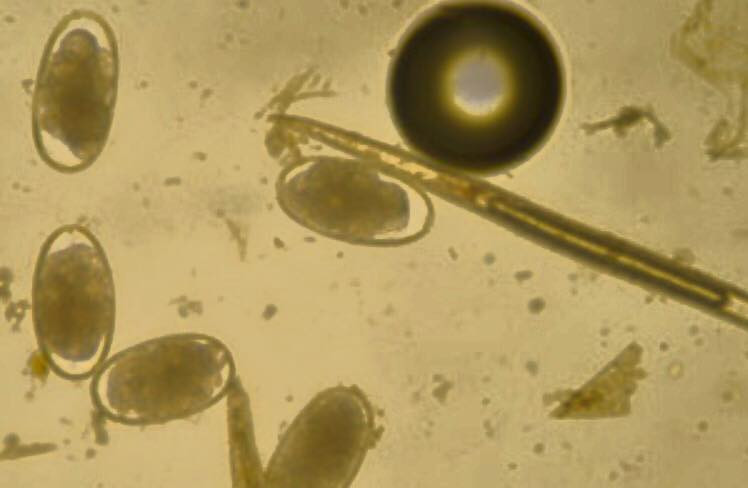Spring is just around the corner and it’s that time of year again when you should all be starting to think about worm egg counts for your horses and ponies. We advise that worm egg counts should be performed every two months throughout the spring/summer, i.e. March to September. A worm egg count is a good way of determining the level of roundworm burden and egg shedding in your horse. Worm egg counts are most useful when all horses in the same grazing group are tested together, so get together with your friends and neighbours on the yard to organise your first spring worm egg count. We can offer a discounted rate for yard worm egg counts if everyone has a worm egg count done at the same time. Your worm egg count result will be reported directly to you, with advice regarding which wormer to give your horse if appropriate, i.e. if the worm egg count is high.
Now is also a good time to be thinking about tapeworm cover. Tapeworm (Anoplocephala perfoliata) is strongly associated with an increased risk of ileal impaction and spasmodic colic. We recommend testing for tapeworm with either a saliva test or blood test at least once every 12 months (or in some cases every 6 months if the individual is at high risk of picking up worms). As with any type of worms, we should alway try to “test before we dose” to avoid the development of resistance to wormers. If your horse has not received a tapeworm dose, or had a tapeworm test performed in the last 6 months, then we would advise either a tapeworm saliva test, or a tapeworm blood test, in conjunction with your next worm egg count. Both of these tests are looking at the level of antibodies to tapeworm your horse has in his or her circulation, reflecting their degree of tapeworm exposure and therefore determining whether or not your horse needs to receive a tapeworm dose.
Tapeworm saliva testing kits are easy to use, and can be collected from our clinic, posted out to you (a postage and packing charge will apply) or brought to you by one of our vets on visits. Tapeworm saliva testing kits currently cost £20 including VAT (price at 04.03.2018). Horses must not eat, drink or be exercised for at least 30 minutes before collecting the sample, and it takes approximately 30 seconds for you to collect the saliva sample from the horse’s mouth, before submitting it to the lab . Alternatively, a blood sample for tapeworm can be taken by one of our vets if you would find this easier. Either way, we will report the tapeworm test result directly to you and advise whether you need to dose for tapeworm at this point.
As ever, if you have any questions regarding worming your horse or pony, please contact us by phone/text on 07747 771182, email us, message us on Facebook, or contact us via our website. Our vets are always happy to help with worming advice, and our head groom Vicky is also qualified to give advice following her SQP training. Our health plans are also a great way to ensure your horse or pony stays up to date with his/her worming; again please contact us if this is of interest to you.
Jess x

